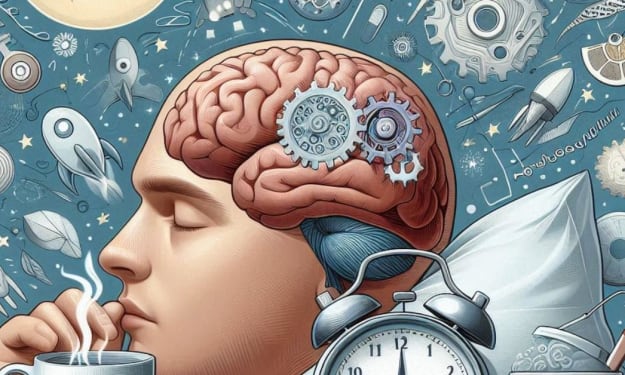“Thinking Ahead: Unraveling the Mysteries of Tomorrow's Thinking"
"Exploring Future Thought: Unveiling Tomorrow's Unanswered Questions."
Once upon a time in a world not so different from our own, the ever-curious Vsauce, embodied by the inquisitive Michael, embarked on a journey through the intricate landscapes of the mind. As he delved into the realms of reason, he found himself grappling with the profound question: Where is your mind?
At first glance, one might think the mind resides solely within the confines of the brain — that wet lump of fat and protein orchestrating memories, plans, judgments, and problem-solving endeavors. However, as Vsauce pondered, he discovered a truth much grander and far-reaching. The mind, he realized, extends beyond the cranial boundaries, entwining itself with the very fabric of our material world — a tapestry woven with threads of wood, stone, steel, and the collective essence of humanity.
Communication, the magical bridge between minds, transforms individuals into interconnected extensions of one another. Through the power of shared memories, perceptions, and knowledge, people become interdependent, contributing to the growth of a colossal, lumbering entity — a 'techno sapien,' fueled by imagination and passion, and guided by the sacred faculty called Reason.
Reason, the beacon of enlightenment, has propelled humanity forward, shaping a world where life expectancy soars, suffering diminishes, collaboration thrives, and progress seems boundless. Yet, as Vsauce contemplated, a shadow loomed over this utopian vision. The organ we employ for reasoning, our brains, painstakingly evolved over millions of years. In stark contrast, the fruits of reason sprout forth rapidly, accelerating into an unpredictable future.
The next four decades promised the construction of new cities at an unprecedented rate, unveiling a world of soaring concrete and expanding horizons. However, this exponential growth came at a cost. The intricate dance of reason seemed to falter against the complexity of our creations, leading to unintended consequences and unforeseen challenges.
Vsauce, the sagacious guide through this intellectual odyssey, unveiled a disconcerting reality. Nearly every aspect of modern life, from the food on our plates to the electricity powering our homes, released molecules with lopsided electrical charges. These seemingly innocuous emissions, when woven into the tapestry of our existence, stirred the winds of climate change, intensifying storms and threatening the delicate balance of nature.
The scale of the problem was staggering — 51 billion tons of such gases released annually, demanding a radical shift from our current trajectory. The looming catastrophe prompted Vsauce to collaborate with none other than Bill Gates, delving into the profound question of how to avoid a climate disaster. A journey intertwined with the very essence of Reason itself.
As Vsauce peeled back the layers of the human psyche, he confronted the enigma of reason — the inherent biases, the subtle dance between intuition and logic, and the societal underpinnings that shaped our cognitive landscape. Behavioral inertia, the tendency to cling to the status quo, emerged as both a survival mechanism and a potential hindrance to innovation.
Reason, it seemed, was not a flawless guide through the labyrinth of existence. Vsauce uncovered the paradox of our cognitive abilities — a delicate balance between individual reasoning and the collective wisdom of the crowd. The social theory of reasoning unfolded, revealing that our minds were not designed solely for objective truth-seeking but, rather, to navigate the complex tapestry of human interactions.
In the age of the internet, where voices resonated across vast digital landscapes, Vsauce posed a crucial question — was our newfound ability to be lone reasoners a boon or a bane? The democratization of communication, while providing a platform for diverse perspectives, also facilitated echo chambers where confirmation bias thrived. The very technology designed to connect us paradoxically fostered disengagement from accountability and a retreat into ideological bubbles.
In the face of these challenges, Vsauce envisioned a return to the roots of reason — a revival of small, targeted discussions and national deliberation days where citizens celebrated the art of dialogue. The idea of a lottocracy, where decisions were made not by elected leaders but by randomly chosen individuals, emerged as a radical yet compelling proposition. The wisdom of crowds, he argued, could guide us toward better decisions, harnessing the collective intellect of a diverse populace.
And so, Vsauce concluded his exploration of the future of reasoning, weaving a narrative that transcended the boundaries of space and time. The challenges of our era, epitomized by the hyperobject of climate change, demanded a recalibration of our cognitive processes. In a world inundated with information and opinions, Vsauce championed the return to a more deliberative, cooperative form of reason — a beacon lighting the path toward a future where the great minds were not a select few but the collective consciousness of humanity itself.
As the tale unfolded, readers were left to contemplate their role in the grand tapestry of existence, recognizing that the lessons of history could guide them toward a future where reason, in its truest form, held the power to shape destinies and transcend the limitations of individual perspectives.
About the Creator
Tallal Jafri
Dive into a universe crafted by Tallal, Uncover captivating narratives that transcend boundaries, beckoning you to a symphony of emotions and adventures. Explore the extraordinary.
Enjoyed the story? Support the Creator.
Subscribe for free to receive all their stories in your feed. You could also pledge your support or give them a one-off tip, letting them know you appreciate their work.







Comments (1)
This was an incredibly well-written piece.